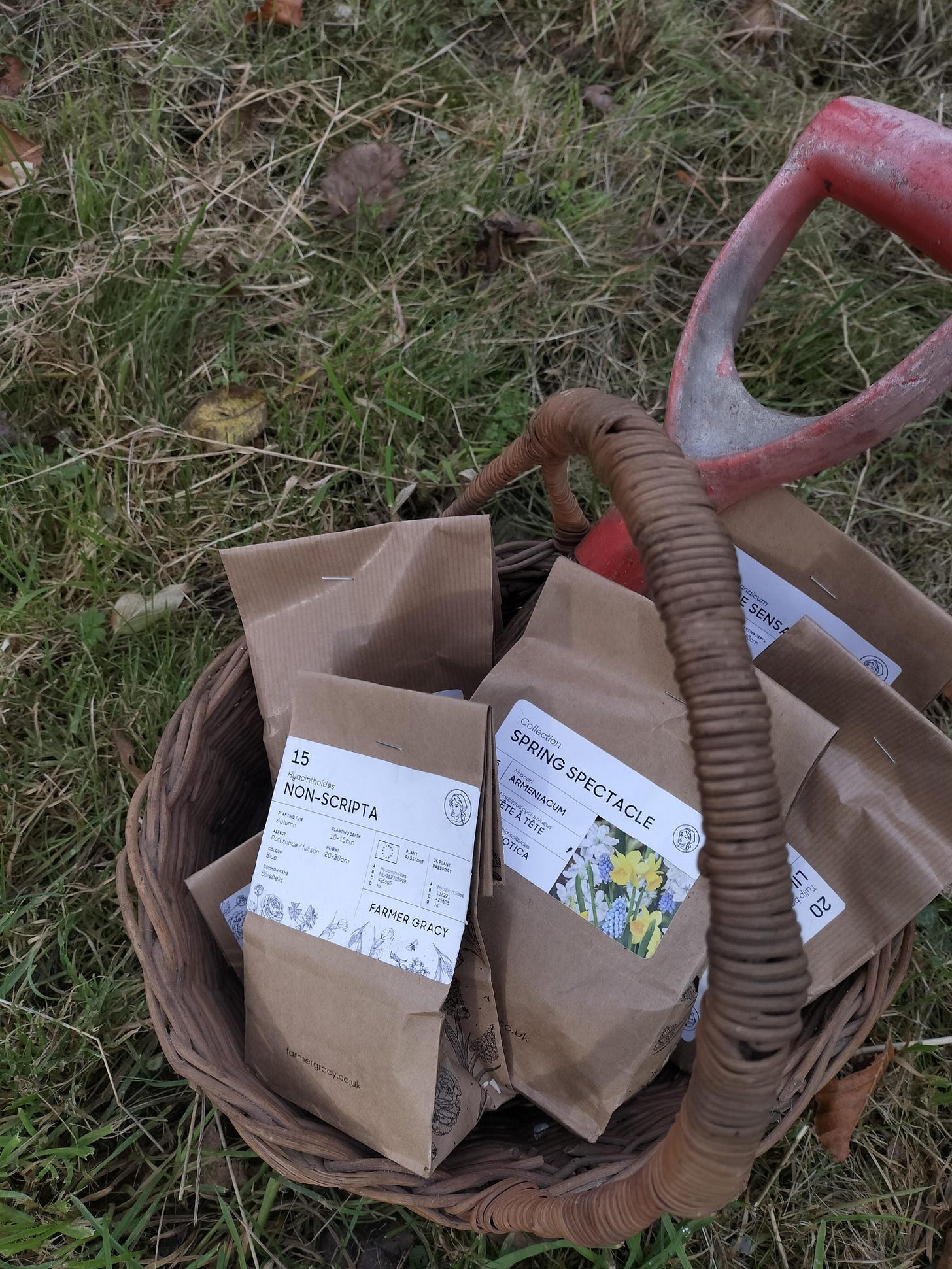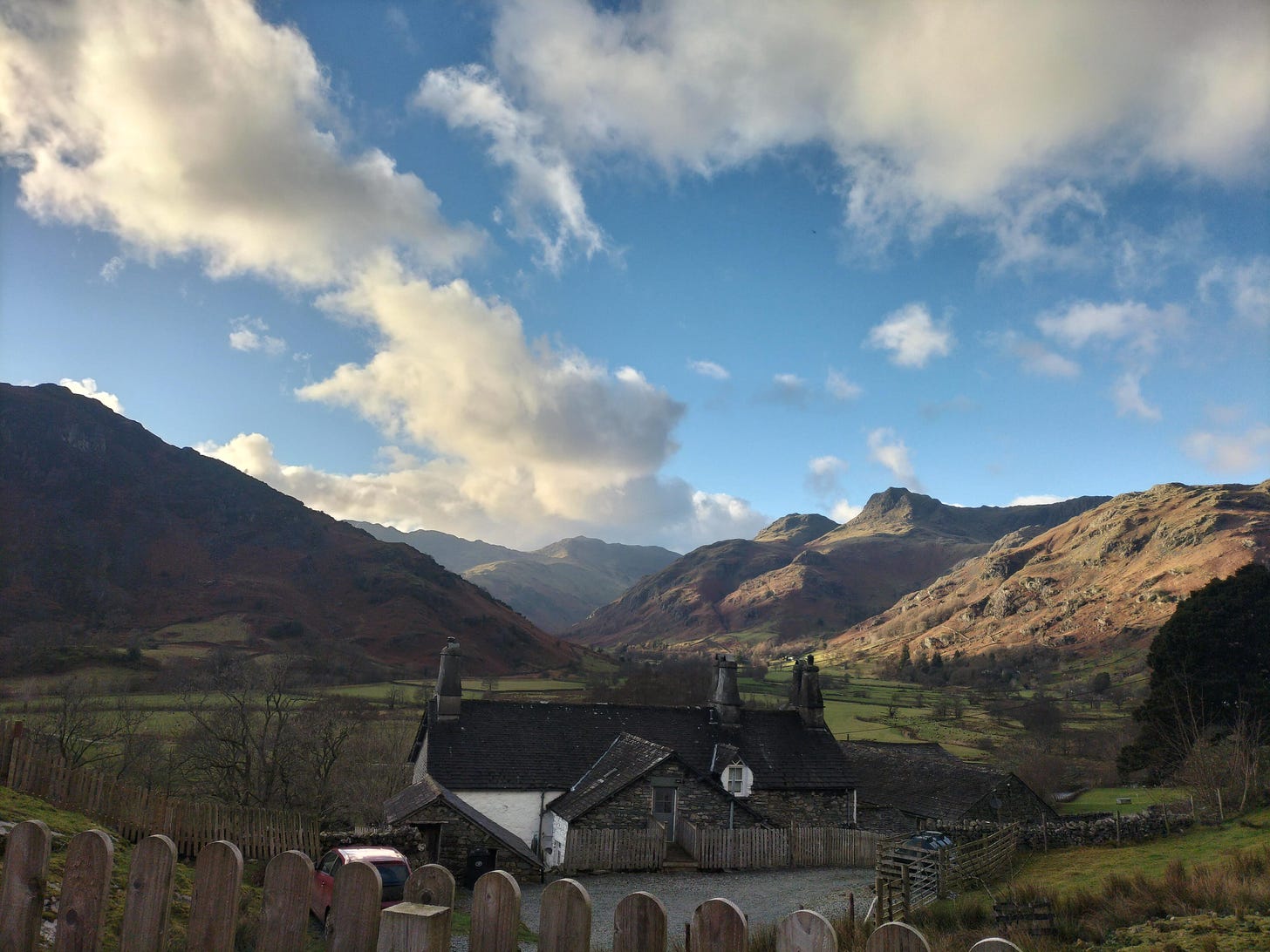Notes from November
A scrapbook of scenes and scenery from the last month.
November was busy, but then what month isn’t these days? But it was a perfect bridge between the autumn and true winter, bringing adventures and retreats, sometimes wrapped up in one and the same thing.
From the Kitchen Window
The wilderness garden has finally had a hair cut after three years of ferality. The beautiful long grass of summer had turned to a brown mess and whilst I’ve noticed an increase in moths and crickets over the past three summers, things that need easier access to the soil, like ground-dwelling bees and my favourite oil beetles seem to have reduced in number. So, it all had to go. Not in September or July like the advice says, of course, but raking back the cuttings brought back to the light patches of bare ground that I quickly pounced upon for planting two hundred-odd bulbs – narcissus, grape hyacinth, bluebells, alliums, crocuses. It felt like an act of hope, to sink into the ground the potential of brightness, not just for next spring, but also for many years to come. A sensation that felt much needed this November.
Beyond the Horizon
A restless month, this November, with travel and traversing interspersed with hours in one spot with a book. The month started in Dublin, at the National Library of Ireland, where I was incredibly privileged to be giving a talk on the presence of Ireland at Shaw’s Corner and Jane Austen’s House (this will be repeated online soon). I rekindled my love affair with Yeats, and my fascination with Irish history. Anyone working in decolonialisation has to have at least a basic understanding of Ireland and it has been so rewarding to revisit and re-entrench myself within this rich and complicated history. Much more reading to follow!
The adventure that was also a retreat took us to beautiful Great Langdale, up (quite literally) in the Lake District, to a cosy cabin on the side of a fell, surrounded by Herdwick sheep, chickens and a friendly robin. The views were outstanding. It is a landscape that I react to very emotively, making me inarticulate. How can I describe how the light falls on just a small section of the fell? The shade of the water in a pool under a craggy old thorn bush? All the colours in the coat of a Herwick Ram. At the moment, it is beyond me, but then I must practice.
Closer to home, but reaching far back into time, we spent a fascinating day at Lyme Regis fossil hunting with a professional paleontologist and came home with pockets full of ammonites and sea urchins hundreds of millions of years old that now sit in our kitchen and are waiting to tell their stories.
Off the Shelf
I have read some brilliant and strange books this month, many relating back to the trip to Dublin, and have a new TBR pile with a strong Wordsworth/mountain focus. The middle of the month found me wanting a bit of escapism from these brilliant, but not always easy, reads, and a trip to the local library found a “pop-up” of vintage crime. I came away with The Moving Toyshop by Edmund Crispin, Speedy Death by Gladys Mitchell, The Red House Mystery by A.A Milne, and The Nine Tailors by Dorothy L. Sayers. They were a rum bunch, and I consumed them as quickly and easy as a good rum and coke. But they left a slightly bitter aftertaste. Running through all of them was a strong streak of classism. All are set up upper-middle class settings, where servants abound. Yet these servants are either not worth questioning, as their simple brains couldn’t possibly have taken anything in, or they are so naturally addled by a crime having taken place in their midst that they are almost hysterical. The Dorothy L Sayers is set within a rural East Anglia community, and here at least, the picture was more nuanced, but the whole plot was based around the complicated and esoteric world of bell ringing, that I only really noticed something in the first chapter or so (before the bell ringing took over). When Lord Peter Wimsey and his ‘man’ Bunter are car-wrecked, they are put up by the local vicar, who tells his wife that they have “a guest,” and that guest is Lord Peter; Bunter is simply not considered as a human being in the same way, until we suspect, Lord Peter points him out: “Your man? Yes, of course. Emily! Take this gentleman’s man-servant into the kitchen and make him comfortable.”
After four books of this, I found that the infantilisation, dehumanisation, mocking of the working class almost seems to underpin this genre of literature, and I closed the covers of them with a relief, and also with the aim to seek out something else. Surely there must be something in between Lord Peter Wimsey and Trainspotting?
On the Page
I’ve not done a lot of writing this month, although I have started experimenting with a new form of journaling inspired by Jane Austen’s use of booklets to write her novels (see the brilliant Jane Austen’s House documentary on this here). One of the highlights of the month was a trip up to Leeds for the annual Museums Association conference, where I took part in a panel on the culture wars backlash, alongside some very brilliant people. I wrote an opinion piece for the MA on it, which you can find here. Around this, I’ve been working on a book proposal and developing some thoughts on Austen and history…
Coming next
Christmas cakes, Wordworths, dragons, fairies, mist, frost, snow?



